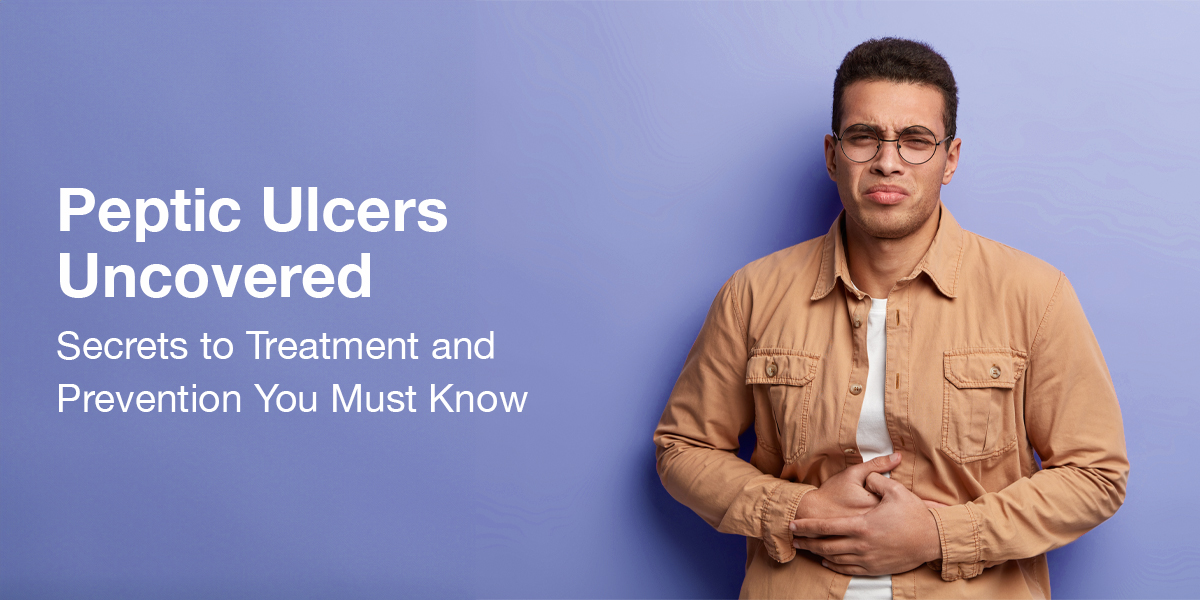Peptic Ulcers Uncovered: Secrets to Treatment and Prevention You Must Know

Millions of people around the world experience a common gastrointestinal condition known as peptic ulcers. Even though they are common, there are many myths and misunderstandings surrounding them. Knowing the symptoms and preventions of peptic ulcers is essential to learning how to cure ulcers easily. In this blog, we will gather information about peptic ulcers to help you take control of your digestion.
What Are Peptic Ulcers?
A peptic ulcer is an open wound found on the stomach lining, specifically in the upper part of the duodenum which is in the small intestines. They develop when there is a disturbance between acidity in the digestive organs, particularly the stomach and the protective coating of the stomach. This shift in balance leads to inflammation and erosion of the mucosal layer and can cause excruciating pain.
Types of Peptic Ulcers
Most of the peptic ulcers occur in the stomach and the part of the small intestine known as the duodenum. Approximately 80% of all peptic ulcers are located in the duodenum, while 20% affect the stomach. In rare cases, ulcers can form in other parts of the digestive tract, such as:
- Esophageal Ulcers: Known as acid reflux disease or when stomach acid wears out the lining of the esophagus.
- Jejunal Ulcers: It may locate to the mid part of the small intestine (jejunum) after surgery of the stomach, they are called stomal or anastomotic ulcers.
Causes of Peptic Ulcers
It is necessary to recognise factors that may lead to the formation of peptic ulcers. The two primary reasons are:
1. Helicobacter pylori (H. pylori) Infection
It is a spiral-shaped bacteria that can penetrate the stomach wall, causing inflammation which results in ulcer formation. In most cases, it spreads through food or waterborne illness.
2. Nonsteroidal Anti-Inflammatory Drugs (NSAIDs)
NSAIDs include ibuprofen, aspirin, and other related drugs and are well known to impair the mucus stomach lining, leading to ulcers.
Symptoms of Peptic Ulcers
It is imperative to identify the peptic ulcer symptoms. Common signs include:
- Abdominal Pain: Heartburn or a feeling of gnawing pain in the stomach.
- Bloating: Most people have a swollen tummy as a sign of bloating.
- Heartburn: Nausea, vomiting, regurgitation of food and sour taste in the throat are associated with ulcers. This may be related to acid reflux or heartburn.
- Nausea and Vomiting: Some individuals may develop headaches, nausea, and even vomiting because of irritation.
- Loss of Appetite: Pain during eating may reduce your appetite, and you will take in less food.
- Unintentional Weight Loss: The symptoms may persist and lead to loss of appetite, causing weight loss.
Suggested Read: How to Beat Irritable Bowel Syndrome
Treatment Options for Peptic Ulcers
Peptic ulcer treatment options include:
Medications
- Proton Pump Inhibitors (PPIs): Medicines like omeprazole, esomeprazole or other proton-pump inhibitors are capable of cutting the stomach acid production, which helps in healing.
- Antibiotics: In case of the H. pylori infection, the patient is treated with antibiotics like amoxicillin or clarithromycin, depending on the severity.
- Antacids: Some anti-inflammatory drugs are available to ease heartburn or indigestion, but ulcers cannot be cured with such drugs.
Lifestyle Changes
- Avoid NSAIDs: If possible, reduce or stop the use of steroidal anti-inflammatory drugs.
- Quit Smoking: If you stop smoking, you can speed up the healing process.
- Limit Alcohol Consumption: Cutting down alcohol consumption is also beneficial.
- Eat a Balanced Diet: If you suffer from stomach issues, consider foods containing fiber. Furthermore, do not consume foods with spices.
- Manage Stress: Yoga and meditation can assist in lowering stress levels.
You can get tested at the top Lucknow gastroenterology clinic and start your treatment soon for a speedy recovery.
Surgery
It is often a simple condition, but if complications like bleeding are severe or there is a rupture, then surgery becomes compulsory.
Conclusion
With peptic ulcers, one has to be conscious of and work towards eradicating them in the best way possible. Understanding what causes the ailments, recognising the early signs, getting proper medical attention and embracing a healthy lifestyle enhance stomach health. In case you think that you have a peptic ulcer or are suffering from some chronic gastrointestinal problem, then it’s high time you seek medical advice and get treated for it.
Request a call back



 Call-an-Ambulance
Call-an-Ambulance



